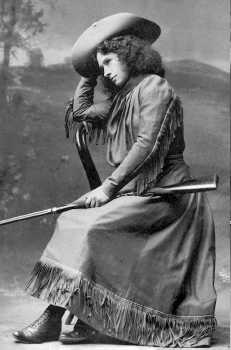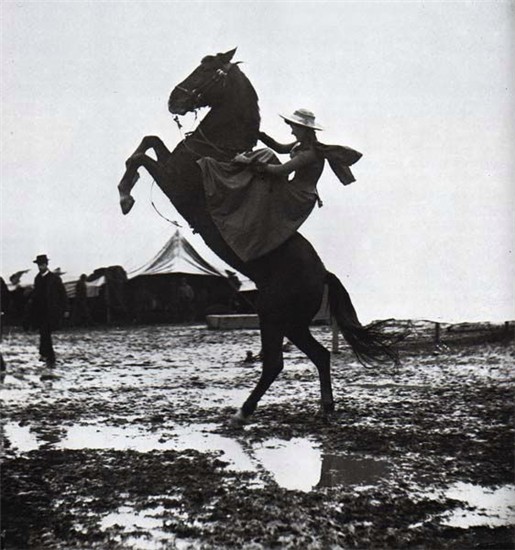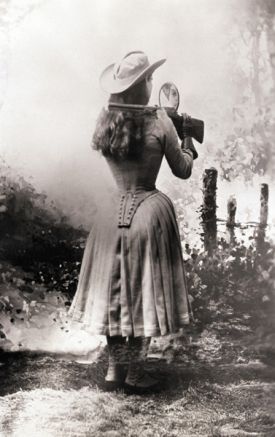


Annie Oakley - America's 1st Female Superstar & Legendary Figure of the Old West
Phoebe Anne Moses (sometimes spelled Mosey or Mozee) was born on August 13th, 1860, to Jacob and Susan Moses, the 6th of 7 children. Her family had a 27 acre farm in a rural area of western Ohio. She learned to shoot as a young child. Annie had a natural ability for shooting game which her mail carrier father sold when he traveled to Greenville, the county seat. In 1866, her father died. Annie's mother was forced to send Annie to the county's poorhouse.
At about age 10, Annie was placed with a farming family as a servant. They were so cruel that later she referred to them as "the wolves". As soon as she was able, Annie returned to her mother and once again supported the family by shooting game. By the age of 15, Annie had completely paid the mortgage on the family farm.
Her marksmanship skills were so perfectly honed that in 1875, Annie entered and won a shooting contest in Cincinnati. Her opponent was the well regarded Frank E. Butler. The next year, Annie & Frank married, setting off on a lifetime of exhibition shooting.
In 1882, she took "Oakley" as her stage name, and in 1884 Chief Sitting Bull adopted her, calling her "Little Sure Shot". The following year, Annie & Frank joined Buffalo Bill's Wild West Show and traveled the world. Because of Annie's 4 foot, 11 inch height, her ladylike manner and demure style of dress, Buffalo Bill called her "Little Missie".
The crowds adored Annie for her extraordinary accuracy. She was equally adept with rifle, shotgun or pistol. Annie could split playing cards, shoot holes through dimes and remove cigarettes from Frank's hands and mouth. She could hit distant targets while riding on horseback and by looking backward using a mirror. Annie always received top billing and was the Wild West Show's top earner. Worldwide, people were fascinated by her.
The Wild West Show travelled everywhere, playing in Baltimore, Maryland on York Road in 1899. On an earlier visit, the Baltimore Sun printed that she "did seemingly impossible things in the way of what in a man would be called marksmanship. The markswoman used rifle, double-barrel, breech-loading guns and pistols with equal dexterity".
About 1912, Annie and Frank were thinking about retirement. They had made a lot of money and were very careful with their savings. This, despite the fact that Annie had always helped to support her family in Ohio, and gave generously to children's charities. Cambridge, on the Eastern Shore of Maryland seemed ideal for their retirement. Annie and Frank purchased land across from Hambrooks Bay. Frank called it "sportsman's paradise".
While living at the Dixon Hotel in Cambridge, Annie designed their retirement home, with special considerations for the display of her many medals and trophies. Later, Annie would donate these to President Woodrow Wilson for the World War I effort. During the World War, Annie and Frank split their time between Cambridge and an apartment in Baltimore.
Because of her slight stature, Annie created a home for her height, especially the kitchen. The home features an upstairs porch where Annie would shoot the bait from Frank's hand while he fished from a rowboat. In Cambridge, they adopted a dog who they named Dave. Dave was often part of Annie's fundraising shooting exhibitions at the Dorchester County Fair.
It was while living in this home that Annie wrote her autobiography, Powders I Have Used, published in 1914. She and Frank often entertained, and Annie introduced pink lemonade to the town. The home is now a private residence, the only home designed and built by Annie to still exist.
While in Maryland, she wrote for magazines, encouraging women to learn how to shoot, to hunt and to ride.
In 1917, missing the limelight, Annie and Frank moved to Pinehurst, North Carolina. There, Annie gave exhibitions, still setting records. She also gave lessons in shooting to women. Annie still enjoyed performing on a larger scale and in 1922, gave an exciting exhibition for 100,000 people in Massachusetts. She attracted large crowds in New York and other cities.
There were plans for a greater comeback and to appear in a motion picture, but in 1923 Annie and Frank were seriously injured in an automobile accident. In 1924, after a long recovery, Annie was again performing and setting records.
By 1925, the couple returned to the Greenville, Ohio area, to be closer to Annie's family. Annie died on November 3rd, 1926 and Frank died 3 weeks later, both of natural causes.
Since that time, Annie's fame has not diminished. There have been books, movies, musicals and a television show. Interest in her adventurous life, especially her determination to overcome all obstacles, continues to fascinate. Annie's star, like the one on her hat, shines on.